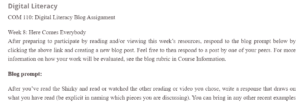Digital Literacy
Shirky’s Ideas on the Significant Role of Social Media in Creating Social Change
In an article titled “Gladwell vs. Shirky” by Bill Wasik of Wired, the author explicitly expounds on the difference in points of view between Malcolm Gladwell (a New Yorker) and Clay Shirky (a professor at NYU) about the role and power of social media to influence activism and pool crowds. Citing a 1960s study by Dough McAdam, Gladwell dismisses social media’s influence as being ‘weak-tie’ social connections that are incapable of replicating the strong-tie social connections produced by the social activism of the mid-20th century. According to Gladwell, Twitter following and Facebook friendships are weak in the sense that they are “ill-suited to get people out into the streets” to demonstrate unless driven by a social activism agenda. What Gladwell simply implies by this statement is that social media connections are not strong enough to hold a social activist group together. On his part, Shirky disputes this notion, arguing that social media is the rock that defines modern activism. Shirky uses the examples of the latest uprisings witnessed overseas, such as the impeachment of the president of the Philippines in 2008, to reinforce his point that ‘barely committed’ social media actors, as labeled by Gladwell, can use social media efficiently to achieve a social revolution. Do you need any help for completing your assignment ? Contact us at eminencepapers.com. We endeavor to provide you with excellent service.
Bijan Stephen reflects Shirky’s ideas about the role of social media in 21st-century activism in his 2015 article titled “Get Up, Stand Up.” Stephen mentions that social media has played a central role in propelling the “Black Lives Matter” movement to new heights – a point that supports the sentiments expressed by Shirky. The #BlackLivesMatter was popularized in 2013 by labor organizer Garza Alicia, a resident of Oakland when she responded to the exoneration of Zimmerman George, the main suspect in the shooting and killing of Martin Trayvon. Since then, Black Lives Matter has become the umbrella that millions of disparate activist groups associate with when pushing for change.
References
Stephen, B. (2015). Get up, stand up: Social media helps Black Lives Matter fight power. The New Republic.
Wasik, B. (2011, Nov 12). Gladwell vs. Shirky: A year to later, scoring the debate over social-media revolutions. Wired. https://www.wired.com/2011/12/gladwell-vs-shirky/
ORDER A PLAGIARISM-FREE PAPER HERE
We’ll write everything from scratch
Question
Digital Literacy
COM 110: Digital Literacy Blog Assignment
Week 8: Here Comes Everybody
After preparing to participate by reading and/or viewing this week’s resources, respond to the blog prompt below by clicking the above link and creating a new blog post. Feel free to then respond to a post by one of your peers. For more information on how your work will be evaluated, see the blog rubric in Course Information.
Blog prompt:
After you’ve read the Shirky and read or watched the other reading or video you chose, write a response that draws on what you have read (be explicit in naming which pieces you are discussing). You can bring in any other recent examples that relate to Shirky’s points about group formation and what groups can achieve in this age of easy connection via social media and the internet.

Digital Literacy
Include an image that relates to the topic in your blog post. Remember images you use should be CC-licensed, or otherwise licensed for your use, and properly credited. You may also use screenshots you create from social media.
Some ideas to consider:
You may use the following ideas as a starting place for your blog post:
1. Toward the end of his chapter, Shirky poses two questions: “Why has group action largely been limited to formal organizations? What is happening now to change that?” What is new about the type of collective action he describes, and the way the groups are formed?
2. Apply Shirky’s ideas about group formation to a current activist group or movement that you’ve been following (or are involved with). Make sure to analyze how the group came about, what happened along the way and what goals were achieved by comparing them to another reading or video of the week.
Grading rubric:
COM 110: Digital Literacy
Blog Rubric
- This rubric clarifies how your work on blog assignments will be evaluated.

